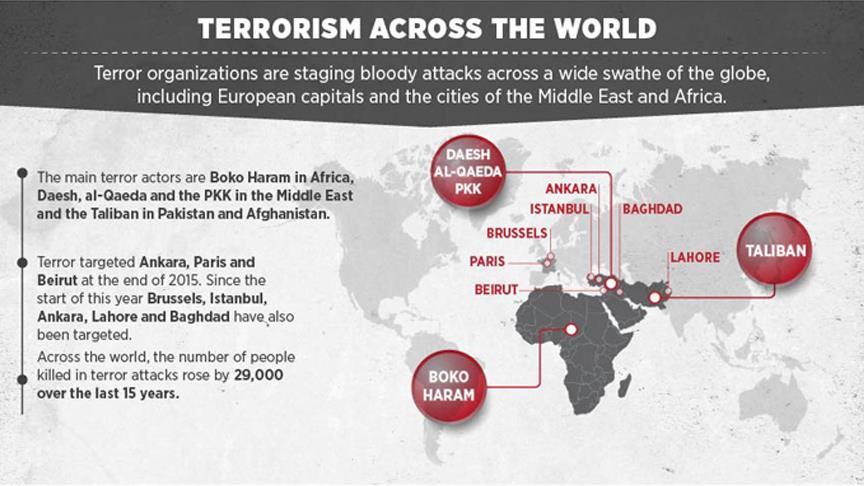Turkish academics urge unity to counter global terror
Anadolu Agency data shows impact of terror attacks around the world

Ankara
ANKARA
Turkish academics called on all countries to work together to counter the threat of terrorism in the aftermath of attacks around the world, including Turkey, Pakistan and Belgium.
Beril Dedeoglu, a lecturer at Galatasaray University and ex-Turkish minister for EU affairs, underlined the importance of solidarity in the face of terrorism.
“All victims of terrorism, including Turkey, France and Belgium, should demonstrate solidarity today; unfortunately, we are quite far from this point,” Dedeoglu said.
Muhittin Ataman, an academic at Yildirim Beyazit University, said: “Terrorism has a direct impact on costs such as political instability, economy and social interaction.”
Akif Kirecci, an academic at Bilkent University, said it is dangerous to make distinctions among terrorist organizations, which carry out attacks in several different countries.
Meanwhile, Anadolu Agency data shows impact of terror attacks around the world.
Boko Haram in Africa
About two million people have been displaced by the six-year Boko Haram insurgency in Nigeria’s northeast region, while since 2013, over 1,200 civilians, 67 soldiers and three policemen have been killed in Boko Haram attacks in Cameroon’s Far North region near the Nigerian border, according to several reports by Nigerian officials.
The group killed close to 500 civilians last year.
Nigeria’s Boko Haram pledged allegiance to Daesh in March last year and now refers to itself as "the Islamic State in West Africa Province".
Since 2009, Nigeria has battled a fierce Boko Haram insurgency that has left thousands dead, especially in the northeastern states of Borno, Yobe and Adamawa.
In recent months, Boko Haram has extended its operations throughout the Lake Chad region, hitting targets in Cameroon, Chad and Niger, as well as Nigeria.
Daesh, PKK and al-Qaeda involvement in the Middle East
Al-Qaeda was founded by Saudi national Osama bin Laden in the late 1980s. The group has carried out attacks against civilian and military targets in several countries, including the 1998 U.S. embassy bombings in Kenyan capital Nairobi and Uganda's Dar-es-Salam.
The al-Qaeda group had infiltrated the African continent since the 1990s.
Just last month, an al-Qaeda-linked group claimed responsibility for an attack on a luxury hotel in Burkina Faso, which left 29 people dead.
After the U.S. invasion of Iraq in 2003, Abu Musab al-Zarqawi established the Jamaat al-Tawhid wal-Jihad a year later to confront American troops.
After many transformations, that extremist group eventually became what is now known as Daesh.
With the deteriorating situation in Iraq and Syria, the group has since managed to establish a strategic terrorist base in the Middle East by seizing large swathes of territory in both countries.
Daesh’s ideology and terrorist methods, meanwhile, have made the group a primary factor in the burgeoning Islamophobia now seen in the West.
Daesh has indiscriminately killed children, women and journalists, destroyed artifacts and historical sites, and has caused Syrian Turkmen, Kurds and Yazidis to flee the country to next-door Turkey.
Turkish President Recep Tayyip Erdogan said that Daesh carried out more than 10 terrorist attacks in Turkey.
Around 200,000 people in southeastern provinces of Turkey have fled their homes because of PKK’s terrorist activities unfolding in the region.
Thousands of people, including women and children have left their homes in Sirnak, Diyarbakir and Mardin provinces.
The PKK -- also listed as a terrorist organization by the U.S. and EU -- resumed its armed campaign in late July. Since then more than 200 members of the security forces have been martyred and around 3,100 PKK terrorists killed.
Ankara considers all three -- the PYD, YPG (PKK's "Syrian affiliate") and the PKK -- as terrorist outfits, and has frequently pointed to the link between these groups active in Turkey and Syria.
The YPG "a pawn of the Syrian regime" over the Feb. 17 Ankara attack that left 28 people dead and 81 injured. Turkish officials have revealed that the attack was carried out jointly by a Syrian-national YPG member and PKK terrorists based in Turkey.
Another militant organization pledging allegiance to Daesh is Somalia’s al-Shabaab.
Established in 2006 to fight the Somali government, the group has for years controlled much of central and southern Somalia, but has since lost ground to African Union forces working in conjunction with the Somali army.
Al-Shabaab has links with various groups in several other countries, including neighboring Kenya. After attacking a university in April -- in which scores of students were killed -- al-Shabaab’s Kenyan branch also pledged allegiance to Daesh.
Taliban in Af- Pak Region
With both the Pakistani and Afghan Taliban waging a series of fresh offensives, security experts are calling for stepped up cooperation between Islamabad and Kabul with a view to ending the 15-year-long insurgency.
They believe a resumption of peace talks between the Afghan government and the Taliban -- the aim of a recently launched joint initiative by Pakistan, China and the U.S. -- could help end the current wave of militant attacks in the two countries, which share over 2,000 kilometers of porous borders.
The Taliban is an Islamic extremist movement in Afghanistan currently waging war.
The Taliban was established in the early 1990s, but was not unified until 1994.
A suicide bomber blew himself up in a crowded park in Lahore on March 27, killing at least 69 people and injuring 300 others.
Jamaat ul-Ahrar, a group affiliated with Pakistani Taliban, claimed responsibility for the bombing -- an unusual occurrence in an otherwise peaceful part of the country. The group's spokesman, Ihsanullah Ihsan, said the target of the attack was an Easter celebration.
According to police, the bomber detonated his explosive-laden vest in a crowded area of Gulshan-e-Iqbal Park, located in a northern district of Lahore, Pakistan’s second largest city and the regional capital of Punjab province.








